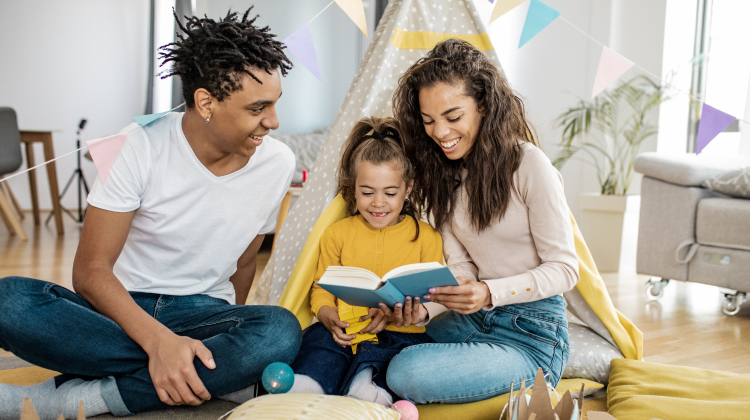Filial Therapy: Definition, How It Works, Benefits & Efficacy 2024

Filial therapy focuses on strengthening family relationships to reduce behavioral disorders and stress in children. This unique type of play therapy utilizes the parent or caregiver rather than therapists to become the agent of change. They are trained to conduct play therapy sessions with their children.
Parents learn how to express basic communication, acceptance, and empathic listening techniques through play. These sessions allow children to see their parents in different roles.
A therapeutic change takes place when children begin to feel understood and accepted. They can release their inner conflicts by expressing themselves more freely in this new safe space created by play therapy.
Research shows filial play session therapy to be an extremely effective therapeutic technique[1]. It recognizes that most emotional issues develop due to a child’s relationship with their parents.
Play sessions focused on improving overall communication and support within the family system can create long-lasting changes for a more unified family.
What Is Filial Therapy?
Filial therapy teaches[1] parents how to treat emotional and behavioral difficulties in their children through play. It models a client-centered approach where the parent becomes the agent of change rather than the therapist.
Through specific techniques, both the parents and child can learn emotional regulation and decrease stress in the relationship. They learn how to communicate and accept each other.
Child-centered play therapy focuses on fostering a healthy parent-child relationship. It’s been shown that even a small amount of attention, affection, and interest in a child is more therapeutic[2] coming from a parent instead of a therapist.
Since most emotional and behavioral issues develop because of the parent-child relationship, integrating the parents into therapy offers a better chance of success both in the short and long term.
Once problems develop, they become much more difficult to treat later in life. Starting therapy early also provides a better chance of developing a healthier parent-child relationship in the future, and it prevents disorders from developing. It helps the parent and child create a better relationship with each other and themselves.
Filial therapy helps parents and children learn how to manage difficulties as they come, even after play sessions end.
How Does It Work?
Filial play therapy takes an integrative approach focused on the parent-child relationship. A trained therapist acts as an educator and guides groups of parents along their journey.
Child problems[2] usually result from a lack of parental knowledge and skill. Beliefs passed down through generations about how to parent can influence future parenting skills whether positive or negative.
The biggest actions parents take that hurt childhood development and emotional health are:
- Daily harsh discipline
- Not validating children’s feelings
- Having unrealistic expectations
Helping parents relate more positively, and disrupting their usual cycle of misperceptions of parents’ feelings, attitudes, or behavior helps children work out their issues. Children finally feel permissiveness and acceptance, which allows them to work out their aggression.
When the parent and child communicate through play, the child can also see their parent in a friendly and playful role. The representation of them solely as parents with certain beliefs and attitudes about their child can be put aside.
This shift in perception can resolve anxiety-producing internal conflicts that develop in children without a healthy relationship with their parents.
Parental Training
Parents are broken up into groups of six to eight and are trained on how to conduct child-centered play therapy sessions. They’re under direct supervision and train once a week[3] for two hours. This continues for several months and up to one year.
Parents observe the therapist playing with other children from the group. The difference is shown in traditional play therapy, where parents don’t always hold space for their child to feel their acceptance, validation, and patient understanding. When ready, typically in less than six months, parents begin play sessions on their own at home.
There are three stages of training:
- Explain the benefits for the child and their relationships with them, such as
- Free expression and communication
- Release of tension
- Increased self-respect, self-direction, and confidence
- After 6-8 sessions, if ready, filial play therapy sessions move from the play therapy center to home. The therapy process gives more attention to the parent’s emotional reactions in this stage. The group setting also allows parents to observe other parenting styles while getting professional psychology tips and advice. Group filial therapy can offer a wider amount of emotional support for families.
- At this stage, therapy goals have been met, and training sessions may be discontinued. Follow-up sessions may take place while the practice of play therapy continues at home. Professional advice and services can be continuously available as the family grows.
Play Therapy Parent Goals
The therapist trains parents on how to act and respond to their children during play. Specific filial therapy techniques are taught, such as constant validation in an understanding and empathetic tone. Parents are coached to:
- Encourage their child to play with them, with limit setting. No destruction of toys or hurtful actions is allowed.
- Develop an empathetic understanding of their child’s needs and feelings that they’re trying to communicate through play.
- Immediately communicate to the child that their needs and feelings are understood and fully accepted, whatever they may be.
- Teach the child to accept responsibility for their actions. With an understanding but firm enforcement of limits, children begin to feel more secure.
Overall, parents are taught how to structure, express contentment, and clarify their feelings. As parents become more accepting and communicative, children begin to see themselves in a new light and feel safer expressing themselves. Feeling understood helps them feel freer and gives them space to release their tension.
Outcomes
The desired outcomes of filial therapy work are:
- Break the child’s perception of their parent’s feelings, attitudes, or behavior towards them.
- Allow the child to communicate their needs, thoughts, and feelings freely with their parent.
- Create an environment where the child can develop and grow their feelings of self-respect, self-worth, and confidence from their newly perceived parental attention and attitude.
What Issues Can Filial Therapy Treat?
Filial therapy can work for children with a variety of different emotional and behavioral issues. It’s also been shown to work for children from all different types of backgrounds.
These are some of the meta-analytic reviews and research-backed[4] issues and situations that filial therapy can help treat:
- Learning difficulties
- Temper tantrums
- Selective mutism
- Mentally challenged children
- Chronically ill children
- Sexually abused children (with non-offending parents)
- Victims of family violence
- Children of incarcerated parents
- Children of parents with different nationalities
- Children of single parents, divorce, blended families
- Adopted or foster children
- Children whose parents were court-referred for child maltreatment
Benefits of Filial Therapy
This type of family therapy works to improve the lives of both parents and children.
Benefits For Child
- Release of tension and inner conflict
- Freedom of expression and communication
- Stronger sense of self-direction
- More self-respect and self-confidence
- Better sense of self-concept
- Feeling more competent, significant, virtuous, and powerful
- Decrease in behavioral problems
Benefits For Parents
- Less stress and frustration
- Better awareness and sensitivity towards the child and their needs
- Increased empathy, understanding, and acceptance
- Improved nurturing and maternal attitude
- Less reactivity and more patience
- Stronger relationship with their child
- More realistic expectations
- Better parenting and interpersonal skills
- More self-awareness, confidence, competence, resourcefulness, and parental acceptance
The benefits of filial therapy carry on through the years. Follow-up studies[4] show that even three years later, 86% of families maintained their improvements.
Improved Chances Of Attending and Continuing Therapy
Another interesting aspect of filial therapy is that it may increase the chances of parents trying therapy in general. Many parents are unwilling to send their children to a therapist alone. Some parents begin to view the therapist as a rival and feel incompetent.
With the filial therapy approach, the parent becomes the most important agent for their child’s improvement, rather than feeling at fault and compared to a trained therapist.
Anxiety and problem behaviors in children can also subside much more quickly when the parent who caused the anxiety changes their behavior.
A therapist alone is not always enough to change the dynamic of family relationships. The parent and child relationship must grow and change together for long-lasting results.
Summary: Is Filial Therapy Effective?
Filial therapy is an effective way to reduce emotional and behavioral problems in children. It uses the most important relationship a child has, the one with their parent, to create change together.
The key emotional needs of a child are to be seen, heard, and understood. Unless a parent develops displays of these skills with their children, emotional and behavioral issues are likely to develop.
A lack of parental knowledge and skill is one of the main reasons why mental health professionals train caregivers directly in filial sessions.
With play therapy, parents learn how to take on a new role with their child. This gives children the opportunity to change their perception of their parents. It allows parents to shift from their usual reactions and become more empathetic, understanding and accepting.
A child-centered imaginary play session approach has shown positive treatment outcomes for both the child’s behavior and total family enhancement.
+ 4 sources
Health Canal avoids using tertiary references. We have strict sourcing guidelines and rely on peer-reviewed studies, academic researches from medical associations and institutions. To ensure the accuracy of articles in Health Canal, you can read more about the editorial process here
- Apa.org. (2023). APA PsycNet. [online] Available at: https://psycnet.apa.org/record/1965-05407-001
- Apa.org. (2023). APA PsycNet. [online] Available at: https://psycnet.apa.org/record/2001-00558-001?doi=1
- Apa.org. (2023). APA PsycNet. [online] Available at: https://psycnet.apa.org/record/2001-00558-002
- Apa.org. (2023). APA PsycNet. [online] Available at: https://psycnet.apa.org/record/2015-16490-001



